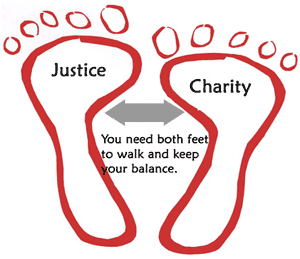Charity vs. Justice
 In my public policy work on behalf of Kentucky’s Catholic bishops, I often have the opportunity to speak and write about the principles of Catholic Social Teaching. Discussion of the Church’s social doctrine, at least when it occurs before a large audience, almost inevitably gives rise to fierce opposition. This opposition can come from people on the “left” as well as on the “right.” In fact, in my experience, opposition is just as likely to come from one side of the political spectrum as the other.
In my public policy work on behalf of Kentucky’s Catholic bishops, I often have the opportunity to speak and write about the principles of Catholic Social Teaching. Discussion of the Church’s social doctrine, at least when it occurs before a large audience, almost inevitably gives rise to fierce opposition. This opposition can come from people on the “left” as well as on the “right.” In fact, in my experience, opposition is just as likely to come from one side of the political spectrum as the other.
For quite some time, I assumed that this opposition was exclusively the result of political loyalties outweighing openness to the perspective of Catholic tradition and social thought. I still believe that is often a cause of hostility, and presents a challenge for all of us. However, I now believe there is another significant cause. As with so many problems within the Church, a lack of catechesis about what the Church actually teaches leaves many of the faithful (and, unfortunately, many priests and deacons) with too little understanding of Catholic Social Teaching to even begin to think through the issues involved.
To take one (very significant) example of this, let us look at the concepts of charity and justice. The primary meaning of charity is, of course, “the theological virtue by which we love God above all things for his own sake, and our neighbor as ourselves for the love of God.” Secondarily, it also means concrete acts of generous assistance toward those in need. The term “justice” however, is the source of much confusion. It is not unusual to hear political activists or commentators argue that there is no such thing as justice in the social realm, except for legal justice in the courts. We are told that terms such as “social justice” or “economic justice” are merely pleasant-sounding euphemisms for socialism. Glenn Beck famously went so far as to say that if your church uses the term “social justice,” leave it!
This creates something of a problem for those of us who belong to the Church that coined the term “social justice.” It is true, of course, that the term is often used in different contexts with meanings vastly different from its meaning in Catholic tradition. The reaction of many to this phenomenon is to simply abandon the term. When has the Church ever done such a thing? Many people misunderstand the term “Immaculate Conception” to mean the virginal conception of our Lord in the womb of our Lady, but surely catechesis is the answer to that misunderstanding, not an abandonment of the term, or a renaming of the Solemnity!
So, what is justice? First, “justice is the moral virtue that consists in the constant and firm will to give their due to God and neighbor.” (CCC 1807) This is probably familiar to most of us. But, other than “legal” justice, strictly speaking, what are the types of justice that have a social aspect? The Catechism identifies several. Paragraph 2411 tells us that commutative (also called “corrective”) justice is that which relates to an economic exchange between persons. There is also legal justice, which deals with obligations to the broader community, and “distributive justice which regulates what the community owes its citizens in proportion to their contributions and needs.”
It is this final concept, distributive justice, which gives rise to the most controversy. I have heard it said many times that there is no societal obligation to ensure this kind of justice, only a moral obligation to be generous that attaches to us as individuals. In fact, I received a comment to a recent article alleging that any obligatory support of others in the area of basic needs would violate the commentor’s right to engage in private charity.
 This understanding of justice vs. charity may be familiar to those immersed in modern libertarian thought, but it is completely foreign to the Catholic tradition. In paragraph 2446, the Church presents us with two quotations that may shock many. First, from St. John Chrysostom, “Not to enable the poor to share in our goods is to steal from them and deprive them of life. The goods we possess are not ours, but theirs.” Then, from the Second Vatican Council, “The demands of justice must be satisfied first of all; that which is already due in justice is not to be offered as a gift of charity.” There is also an entire section (paragraphs 2426-2435) on “social justice,” and a number of other paragraphs teaching similar truths.
This understanding of justice vs. charity may be familiar to those immersed in modern libertarian thought, but it is completely foreign to the Catholic tradition. In paragraph 2446, the Church presents us with two quotations that may shock many. First, from St. John Chrysostom, “Not to enable the poor to share in our goods is to steal from them and deprive them of life. The goods we possess are not ours, but theirs.” Then, from the Second Vatican Council, “The demands of justice must be satisfied first of all; that which is already due in justice is not to be offered as a gift of charity.” There is also an entire section (paragraphs 2426-2435) on “social justice,” and a number of other paragraphs teaching similar truths.
If we take a step back from these selected quotations and place them in context, we notice that they are in the larger section covering the Seventh Commandment, “You shall not steal.” Those things which a person rightfully has access to are already theirs. The question of whether or not they actually have access to them is a question of justice. Of course, the virtue of charity compels us as Christians to work toward a greater realization of justice. As Pope Benedict XVI observed in Caritas in Veritate,
Love – caritas – is an extraordinary force which leads people to opt for courageous and generous engagement in the field of justice and peace…This dynamic of charity received and given is what gives rise to the Church’s social teaching, which is caritas in veritate in re sociali: the proclamation of the truth of Christ’s love in society. (1, 5)
So what are we to make of the modern economic view that markets are always to be trusted to yield a just outcome, if only they are allowed to operate freely? Such a proposition is true only if the society in which the market operates is guided by a strong sense of justice. As Pope Benedict further summarizes, “[A market] is shaped by the cultural configurations which define it and give it direction…But it is man’s darkened reason that produces these consequences…Therefore it is not the instrument that must be called to account, but individuals, their moral conscience and their personal and social responsibility.” (CV, 36)
These teachings must be balanced by the Church’s equally strong condemnation of socialism, understood as the communal ownership of the means of production through the instrumentality of the state. But, one of the reasons socialism is condemned is that it violates distributive justice, preventing labor from receiving its just fruits. Likewise, a capitalist system that violates distributive justice also fails the same test. This is clearly the case in our current economic situation. The challenge is to address the problem with a clear head and sound reason, and not retreat into our comfortable political ideologies.

